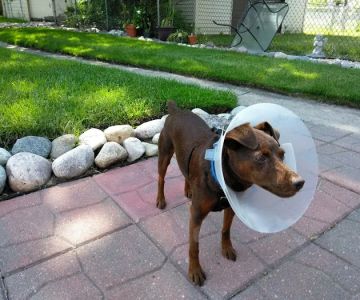Puppy Care Tips for First-Time Owners
Bringing home a puppy for the first time is an exciting and heartwarming experience. As a first-time dog owner, you might feel overwhelmed with all the new responsibilities that come with caring for your new furry friend. From ensuring they’re eating the right food to understanding their behavior, puppy care requires patience, time, and love. I remember when I brought my first puppy home — the joy was immense, but I quickly realized that taking care of a puppy is more than just playing and cuddling. In this guide, I’ll share some essential puppy care tips to help you ensure your puppy grows up healthy, happy, and well-adjusted.
1. Establishing a Routine
Puppies thrive on routine. Just like children, they feel more secure when they know what to expect. Establishing a daily schedule early on can help your puppy feel safe and settled in their new environment. This includes regular feeding times, potty breaks, playtime, and training sessions. When I first adopted my puppy, I made sure to follow a consistent schedule, which helped immensely with potty training and getting him used to his new home.
Feeding should be done at the same times each day, as puppies need regular nutrition to grow strong. Your vet can advise you on how much food your puppy should be eating based on their breed, size, and age. I found that setting regular play and rest times also helped my puppy learn when it was time to be active and when it was time to relax.
2. Proper Nutrition and Diet
Just as we require balanced meals for good health, so do our puppies. A high-quality puppy food is essential for their growth and development. Puppies have different nutritional needs than adult dogs, as they are in their growth phase and require more protein, fats, and essential nutrients to build muscles and bones.
When I first brought my puppy home, I researched the best types of food for his breed and size. It’s important to feed your puppy food that is specifically designed for their stage of life. Additionally, I learned that it's crucial to monitor your puppy's weight and adjust their food intake as needed to avoid overfeeding or underfeeding. Over time, you may need to transition them from puppy food to adult food as they grow. Be sure to consult with your veterinarian to make sure you are feeding the right amount and type of food.
3. Socialization and Training
Socializing your puppy is one of the most important steps in their development. Early socialization helps puppies become well-adjusted adults and helps them learn how to interact with other dogs, animals, and people. Puppy socialization should begin as soon as possible. This includes exposing your puppy to different environments, sounds, and experiences in a controlled manner.
Along with socialization, basic training is essential. I started teaching my puppy simple commands like "sit," "stay," and "come" early on, and this helped me create a bond with him while teaching him the rules of the house. Positive reinforcement, like treats and praise, is a powerful tool in training. Be patient — puppies learn at their own pace, and repetition is key.
4. Potty Training Tips
Potty training is one of the most challenging tasks for first-time puppy owners, but with patience and consistency, it can be done. When I first started potty training, I made sure to take my puppy outside regularly, especially after meals and naps. Puppies typically need to go potty every 2-3 hours, so frequent bathroom breaks are necessary.
Crate training is also a helpful method for potty training. Dogs generally don’t want to soil their living area, so a crate can be used as a tool to encourage your puppy to hold it until they are taken outside. However, never leave your puppy in the crate for too long, as they need regular breaks for exercise and socialization.
5. Regular Veterinary Visits
One of the best things you can do for your puppy is to establish a relationship with a veterinarian early on. Regular check-ups are essential for monitoring your puppy’s growth, vaccination schedule, and overall health. Your veterinarian will also provide advice on flea and tick prevention, as well as other important health tips based on your puppy's breed.
I remember my first vet visit like it was yesterday. It was an opportunity to ask all the questions I had about my puppy’s health and get a better understanding of what was normal in terms of growth and behavior. Your vet will also help you develop a vaccination plan and recommend microchipping your puppy for their safety.
6. Exercise and Playtime
While puppies need plenty of rest, they also need plenty of exercise and playtime to stay healthy and happy. Regular exercise helps with physical development and provides an outlet for their energy. I found that taking my puppy on short walks and engaging in interactive play sessions helped him stay active without over-exerting himself.
Different breeds have different exercise needs, so it’s important to tailor your puppy’s activity level based on their breed and size. For example, larger breeds or more active breeds might need longer walks, while smaller or less energetic breeds might require less. In addition to walks, I made sure to provide stimulating toys for mental exercise, such as puzzle toys that challenge his problem-solving skills.
7. Grooming and Hygiene
Proper grooming is a vital part of puppy care. Whether your puppy has short or long hair, regular brushing and bathing are important for keeping their coat clean and healthy. When I first brought my puppy home, I made it a habit to brush him at least twice a week to keep shedding under control and prevent matting. Bathing can be done once a month or as needed, but avoid over-bathing as it can dry out their skin.
In addition to grooming, nail trimming and ear cleaning are essential. I learned that many puppies are sensitive to nail trims, so I made sure to start early and make the experience as positive as possible. Regular ear cleaning can prevent infections, and keeping up with dental care is equally important to maintain your puppy’s oral health.
SEO Title: Essential Puppy Care Tips for First-Time Owners SEO Keywords: puppy care tips for first-time owners, how to care for a puppy, puppy care advice, first-time dog owner tips SEO Description: Discover essential puppy care tips for first-time owners, including feeding, training, and grooming advice to ensure your puppy grows healthy and happy.










